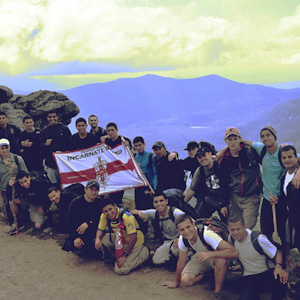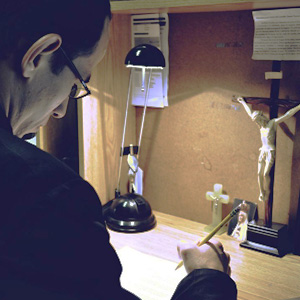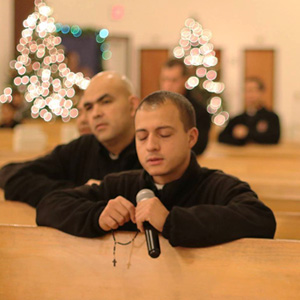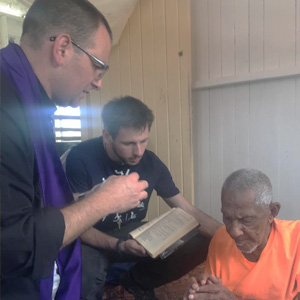Formation
Becoming a priest of the Institute of the Incarnate Word
Pillars of Formation
In both the novitiate and the seminary a young man’s formation is focused on four main areas:

Human

Intellectual

Spiritual

Pastoral
The Program
A novitiate and a major seminary must take care that the future priests are duly prepared, employing all the means so “the whole training of the students should have as its object to make them true shepherds of souls after the example of Our Lord Jesus Christ, teacher, priest and shepherd” (OT 4). Priests configured to Christ head and shepherd and thus committed to share and continue his mission of salvation in the Church and in the world (Cf. PDV 61). Priests configured to Christ head and prompted “to serve Christ, Teacher, Priest and King, in whose ministry they participate. For this ministry, the Church incessantly builds itself here on earth, as a people of God, body of Christ, and temple of the Holy Spirit” (PO 1).
This is why they must specifically be prepared to perform the threefold ministry of teaching, sanctifying, and guiding the people of God, as ministers of Christ and as participants in his only priesthood. “Hence, they should be trained for the ministry of the Word, so that they may gain an ever increasing understanding of the revealed Word of God, making it their own by meditation, and giving it expression in their speech and in their lives. They should be trained for the ministry of worship and sanctification, so that by prayer and the celebration of the sacred liturgical functions they may carry on the work of salvation through the Eucharistic sacrifice and the sacraments. They should be trained to undertake the ministry of the shepherd, that they may know how to represent Christ to men, Christ who “did not come to have service done to him, but to serve others and to give his life as a ransom for the lives of many” (Mk. 10.45; Jn. 13.12-17), and that they may win over many by becoming the servants of all (I Cor. 9.19)” (OT 4).
To attain this proper preparation of a future priest in order to perform the threefold ministry fruitfully and with dignity, a program of life becomes necessary—a program that in being organized and unified dedicates itself intensely to all aspects of formation: human, spiritual, intellectual and pastoral, also bearing in mind, in the midst all these elements, the specific objective of this whole formation—an objective that confers it unity and consists in preparing these shepherds of souls for the priesthood (Cf. PDV 61). This pastoral character of the entire education, precisely for being its specific objective, it not a secondary element, not even an additional element, although important, but rather the essential and even principal element of the formation of seminarians, future shepherds. Directrices teaches: “all formation of candidates to the priesthood is oriented toward preparing them in a specific way to communicate the charity of Christ, Good Shepherd. Therefore, this formation, in its diverse aspects, must have an essentially pastoral character” (OT 4).
In this sense, we can rightfully affirm that a seminary, more than a place or temporal space, is a “spiritual place” (PDV 42) in which is helped and ensured the educational process of becoming, through the sacrament of orders, “a living image of Jesus Christ, Head and Shepherd of the Church” (PDV 42).
Human formation is the necessary foundation of the entire priestly and religious edifice. This need flows from a right understanding of the relationship between nature and grace. Grace does not destroy nature; rather, it builds upon it by healing, raising, perfecting, dignifying and ennobling man’s nature.
Because of the greater demands of his vocation, the priest should reflect – as every Christian should – the Incarnation of the Word, in whom human perfection and divine perfection shine, in intimate union without detriment to either. Moreover, he must serve as a bridge, and not as an obstacle to others. God has called him from among men and made of himtheir representative before God, such that he should make his ministry acceptable and believable from a human standpoint, for the greater glory of God and the salvation of his fellow men. To this end we believe that every seminarian of the IVE must be balanced, strong, and free.
Human formation “leads to and finds its completion in spiritual.” This field that has utmost importance in priestly education is founded on the religious dimension of men—essential and constituent—existing in the natural level by which “the human individual is open to transcendence” and on the supernatural level, for “every human being, as God’s creature who has been redeemed by Christ’s blood, is called to be reborn “of water and the Spirit” (cf. Jn 3:5) and to become a ‘son in the Son.’”
The spiritual life must be understood as “a relationship and communion with God,” not in any way but in the originality of the evangelical newness—a union through grace and charity, caused in an ordinary way by the sacraments of the Church, in Jesus Christ with the Most Holy Trinity. From being a “new creatures in Christ who walk in the Spirit.”
This spirituality, common to every Christian, must be structured according to the uniqueness of the priestly being and acting. In such a way that “not just by virtue of Sacred Ordination, but also by an intimate, life-long participation, they become in a special way other christs.” Given this structure, we must remember that spiritual formation of future priests will develop the baptismal grace coupled with the development of the “virtues and habits of presbyteral life.”
A spiritual formation that constitutes the “core which unifies and gives life to his being a priest and his acting as a priest” which is the foundation of pastoral life and that “should be closely connected with the doctrinal and pastoral.”
After having laid the foundation, we point to the triple path that must be undertaken to search and find the union with Christ: “a faithful meditation on the word of God, active participation in the Church’s holy mysteries and the service of charity to the little ones” (PDV 46).
- Connected with the doctrinal so that spiritual life will have its nourishment and firmness, as canon law teaches: “the spiritual formation and the doctrinal instruction of the students in a seminary are to be harmoniously blended,” since science without virtue makes men arrogant, and virtue without science becomes useless.
- Connected with pastoral formation, which precisely specifies the characteristic aspect of spiritual formation of seminarians insofar as it is directed to forming worthy shepherds of God’s people. Precisely through the “spiritual formation students are to be fitted for the fruitful exercise of the pastoral ministry.”
- The faithful meditation on God’s Word: This refers to the meditated and prayerful reading of the Word of God that includes the values of faith, prayer, and silence.
- Active participation in the sacred mysteries of the Church: The celebration of the Eucharist has an “essential importance” in the spiritual formation of the seminarians, and it must be the “essential moment of their journey” actively participating “daily.” Also, in this second path to travel in order to find Christ, the principal education about full participation in the sacramental and Eucharistic liturgy must be accompanied by the training in the Liturgy of the Hours or Divine Office. It is also important to inspire in the seminarians, in the celebration of Mass and the recitation of the Divine Office, the zeal for salvation of the souls, indicating that in the Holy Mass “Christ, High and Eternal Priest, perpetuates his redeeming sacrifice in the altars of all over the world in such a way that the effects of his Passion reach all men of all times” and that the Divine Office recited “in name of the Mother Church,” in the voice of the wife that is elevated “for the salvation of the entire world.” Finally, in the celebration of the sacraments “it is necessary and very urgent to rediscover within spiritual formation the beauty and joy of the Sacrament of Penance.” Urgent in the current societies that have lost a sense of sin and therefore the consoling joy of forgiveness. A Sacrament of Penance to which students must “to approach frequently.”
- The service of charity: Spiritual formation of the future priest includes the third path that leads to Christ: charity that is bond of perfection (Col 3”14). It is about “seeking Christ in people.” Love and union with fellow men is necessarily born from love and union with God. It is the example Christ gave: of his love for the Father and of his love for men to the point of sacrificing himself by giving his life. Like Christ: I have given you a model to follow (Jn 13:15) so too priests, Christ’s representatives, must imitate his love for the Father and for men. So that as I have done for you, you should also do. (Jn 13:15), even giving one’s life: the way we came to know love was that he laid down his life for us; so we ought to lay down our lives for our brothers. (1Jn 3:16). Priests are “men of charity” and their mission is “to educate others according to Christ’s example and the new commandment of brotherly love (Cf. Jn 15:12).” Therefore, preparation for the priesthood “must necessarily involve a proper training in charity” and particularly in the preferential love for the “poor” in whom our faith discovers Jesus (Cf. Mt 25:40) and a merciful love for sinners.
In addition to the formation received through participation in the liturgy and community activities, a seminarian’s academic formation is of prime importance, since being open to knowing God and adhering to him is an irreplaceable requirement of the human intellect.
Philosophical and theological formation are the two essential moments of the educational program of the major seminary.
The study of philosophy is “a crucial stage of intellectual formation.” With its help, the students must be led “in such a way that the students are first of all led to acquire a solid and coherent knowledge of man, the world, and of God,” that is, a deep understanding of the person and of the person’s freedom in his relationships with the world and with God. Philosophical knowledge, that is, for its causes and in depth, of these realities completes the human formation of the students and helps to sharpen their mind. The habit of a sound philosophy will give the student the awareness “of the fundamental relationship that exists between the human spirit and truth,” will guarantee the certainty of truth, that is, the ability of the intellect to possess the truth about things, what they truly are, that is “to attain the sense of ‘being’.”
The sense of Being will provide solidity to the affirmation; it will awaken the critical sense and the capacity to discern the truth, to understand and accept it, no matter where it comes from. Consequently, it will enable him to make objective and solid judgments of things and especially of the problems and situations of life, without being shaken by any sentence with serious detriment to his ministry.
He must have a “type of ‘loving veneration for the truth’ that leads to recognizing that it is not created and measured by men, but rather is given to men as a gift from the Supreme Truth, God, albeit in a limited way and often with difficulty, human reason can reach objective and universal truth, even that relating to God and the radical meaning of existence.” The study of the philosophical disciplines is also necessary to be adequately prepared for a fruitful and effective dialogue with the men of our time, as required by the apostolic ministry. A requirement that today is particularly urgent given the cultural situation that extols subjectivism as criterion and measure of truth.
Specially, our seminarians must be immersed in the philosophy of St. Thomas Aquinas, so as to acquire a “living Thomsism”:
- direct contact with Aquinas himself, in his principal and secondary works, diachronically analyzed (in their historical evolution) and synchronically (in all its work);
- arriving thus to the authentic thought of St. Thomas;
- and being able to think from a Thomistic perspective, entering in dialogue and polemic with the problems and contemporary thinkers;
- living Thomism that contrasts with a formalized and fossilized Thomism. This is what Fr. Fabro calls “essential Thomism”.
Finally, philosophy has a singular importance as preparation for the study of theology, and thus, respecting its own essence and method, we must remember this purpose in its teaching. This way, they must be organized so “that they help the student to penetrate and live his faith more deeply.”
In the content of the future priest’s intellectual formation lies the study of sacred theology, as most specific and characteristic of it. Said formation precisely “is based and built above all on the study of sacred doctrine, of theology,” according to its own nature. With the light of faith and the guidance of the Magisterium of the Church, the purpose of the study of theology is that students “will correctly draw out Catholic doctrine from divine revelation, profoundly penetrate it, make it the food of their own spiritual lives, and be enabled to proclaim, explain, and protect it in their priestly ministry.”
As we have seen, all formation in its various aspects has a character that is essentially and primarily pastoral, for its purpose is no other than the preparation of shepherds of souls, who will communicate the charity of Christ, Good Shephard, as St. Peter refers to Our Lord, the chief Shepherd (I Pe 5:4). Since our Institute has apostolic branches and especially priests of apostolic life, “the pastoral endeavors are essential to it.” This pastoral formation, like all formation, develops through mature reflection and practical application, and it finds its foundation and strength in one spirit.
Pastoral practice, however, cannot be reduced, not even in the best of cases, to a competent science or a truly technical practice, but rather, “the seminary which educates must seek really and truly to initiate the candidate into the sensitivity of being a shepherd, in the conscious and mature assumption of his responsibilities, in the interior habit of evaluating problems and establishing priorities and looking for solutions on the basis of honest motivations of faith and according to the theological demands inherent in pastoral work.” It means to be a witness of Christ’s charity who went everywhere doing good (Hch 10:38), and visible sign of the Church, mother and teacher of the people. Educating the future priest to live authority as service, moved only by pastoral charity. These pastoral practices of the future priest must assume a clear ‘ministerial’ character in connection with the triple service of the word, worship, and government of the community
The Ideal
Seminarian
To conclude, let us say that we want to form seminarians who live the “lordship,” over themselves, over people, over the world, and over the devil; who enjoy the “liberty” of God’s children in the full docility toward the Holy Spirit, being convinced that everything are yours; whether Paul, or Apollos, or Cephas, or the world, or life, or death, or things present, or things to come; all are yours; and you are Christ’s; and Christ is God’s. (Co 3:21-23); who have a “spirit of prince” and who are noble;681 who are valiant and are totally resolved to attain holiness; who overcome the temptations characteristic of the priestly state, such being egocentric, functionary, stingy, inconstant, boring, improviser, frivolous, irritating, mediocre, parochial, affected, avaricious, ill-humored, secularized, fearful, timid, rambling, and ubiquitous.
Seminarians who admire and love the truth, actualized by an extensive intellectual formation; who dedicate time to theory and intellectual leisure and that it be a true search for the truth, i.e., that he be able to know it with certainty and to appropriate it in contemplation; an intellect applied to temporal things in subordination to the consideration of eternal realities so that the one will serve as a means to know the other: the invisible things of him since the creation of the world are clearly seen, being perceived through the things that are made (Ro 1:20), and from the eternal, as known, to judge the temporal things. An intellect that searches for reason, to find and rest in what is understood, for “reasoning in regards to understanding is like moving in regards to resting or as acquiring is to possessing.” Therefore, reason and intellect can be compared, as time and eternity.As Boethius says, “Reason is exclusive to the human genus as intelligence is proper to the Divine.”
Accustomed to discipline, i.e., “submission to the rules of life in order for the truth to become incarnate in the life of the disciples;”689 that they be virtuous men in accord to the doctrine of “the great teachers of the spiritual life, especially Saint Augustine, Saint Thomas, Saint John of the Cross, Saint Teresa of Jesus, Saint Ignatius of Loyola, Saint Louis-Marie Grignion de Montfort, Saint Thérèse of the Child Jesus; and from the example of all the saints of all times that the Church proposes as examples of virtue for us to imitate.”
Seminarians who know how to value each thing in a hierarchical manner, who love the congregation living its own charism.
Seminarians with an artist’s soul, for “who can deny that the religious sentiment, the religious truth, the longing of what is finite for what is infinite have been and always will be springs that give life to the most lofty poetry? Is not this, in fact, its highest and purest form? When, with its characteristic language—in which song prefers to speak, painting prefers argumentation, sculpting prefers speech—poetry expresses the mystical experience, the psychology of grace, ecstasy, and it rises to the Supreme Beauty, to God, to the Truth that transcends all thought…then it becomes a magnificent gift from God’s kindness; it becomes a reflection of his grace.”
Above all, we want to form seminarians who are disposed to “given over totally to the service of God and to the pastoral ministry,” even including martydom in the example of the first Argentinean blessed, Benito de Jesus; of the priest and seminarian martyrs of Barbastro; of the Blessed Augustine Pro, priest; and of so many others.
In conclusion, we want to form our future priests so that they can be “poets, metaphysicians, and soldiers, who sing, contemplate, and fight.”
"We aspire to form priests for the Catholic Church according to the Heart of Christ.”
IVE Constitutions, 231
